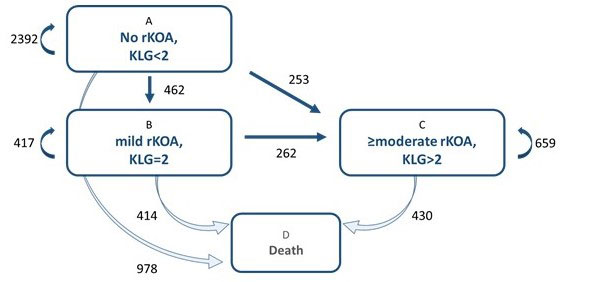Session Information
Session Type: ACR/ARP Abstract Session
Session Time: 11:00AM-12:30PM
Background/Purpose: Musculoskeletal injury is a known risk factor for osteoarthritis (OA). Cumulative effects of comorbid conditions on the association of injury and OA have not been previously examined. The purpose of this study was to clarify associations between knee injury and radiographic knee osteoarthritis (rKOA) and determine whether associations vary by sex, race, body mass index (BMI), diabetes mellitus (DM), and cardiovascular disease (CVD).
Methods: Data were from 4093 participants of the Johnston County Osteoarthritis Project who were enrolled during 1991-1997 (Original Cohort) and 2003-2004 (Enrichment Cohort). Data were from baseline and up to three follow-up study visits (over ~18 years). All knee radiographs were read for Kellgren-Lawrence grade (KLG) of 0-4. Using Markov multi-state models in a time-to-event approach, a progressive model included states of: (A) no rKOA (KLG< 2), (B) mild rKOA (KLG=2), and (C) ≥moderate rKOA (KLG >2 or total knee replacement; Figure 1). Hazard ratios and 95% confidence intervals (HR [95% CI]) were estimated to determine associations between knee injury and rKOA transitions, examining six variables as potential effect modifiers or covariates: age, sex, race (White, African-American), BMI (normal [< 25 kg/m2], overweight [25-< 30 kg/m2], obese class I [30-< 35 kg/m2], and obese class II [35+ kg/m2]), self-reported DM, and self-reported CVD.
Results: At baseline, participants had a mean age of 61 years (SD±10), were 63% women, and were 34% African American; 19% reported a prior knee injury, 40% were obese,13% reported DM, and 22% reported CVD. During the study period, 2738 participants had no transitions. In adjusted models, the hazards of incident mild and ≥moderate rKOA were higher among those with baseline knee injury (1.25 [0.99, 1.59] and 1.71 [0.99, 2.96], respectively). Knee injury was associated with incident mild rKOA among Whites (1.38 [1.04, 1.81]) but not among African Americans (0.93 [0.57, 1.51]). Associations did not differ between any transition states in interactions with sex or DM. Knee injury was not associated with incident rKOA transitions among individuals with normal BMI, but positive associations were observed in some higher BMI categories (Table 1). Among those without CVD, knee injury was associated with rKOA (1.48 [1.13, 1.93]). Among those with CVD, knee injury was not associated with rKOA but was associated with ≥moderate rKOA (4.15 [1.12, 15.4]).
Conclusion: The relationship of knee injury and rKOA transitions differs by race, CVD, and BMI. Maintaining a normal BMI in the setting of knee injury may mitigate the impact of a joint injury upon development of knee OA.
To cite this abstract in AMA style:
Golightly Y, Alvarez C, Arbeeva L, Cleveland R, Schwartz T, Murphy L, Renner J, Callahan L, Jordan J, Nelson A. Knee Injury and Transitions Among States of Knee Osteoarthritis in the Johnston County Osteoarthritis Project: A Multi-State Time-To-Event Modeling Approach [abstract]. Arthritis Rheumatol. 2019; 71 (suppl 10). https://acrabstracts.org/abstract/knee-injury-and-transitions-among-states-of-knee-osteoarthritis-in-the-johnston-county-osteoarthritis-project-a-multi-state-time-to-event-modeling-approach/. Accessed .« Back to 2019 ACR/ARP Annual Meeting
ACR Meeting Abstracts - https://acrabstracts.org/abstract/knee-injury-and-transitions-among-states-of-knee-osteoarthritis-in-the-johnston-county-osteoarthritis-project-a-multi-state-time-to-event-modeling-approach/


